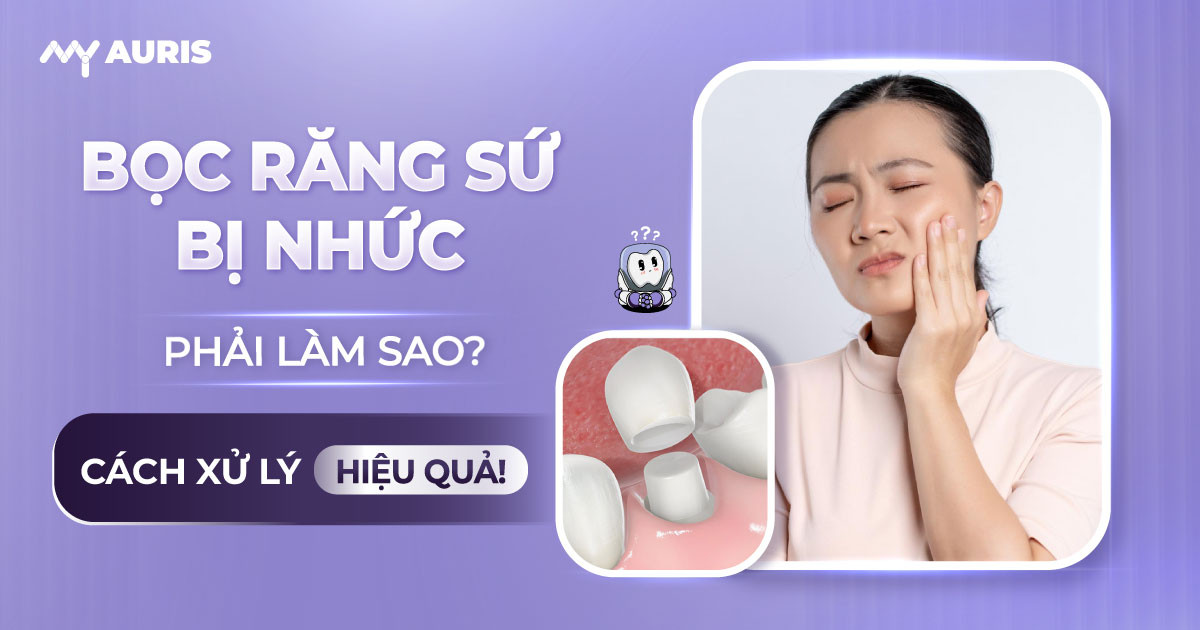Ceramic crowns are a popular solution to improve the aesthetics and chewing function of teeth, but after porcelain crowns, some people may experience gum pain. What should you do if your porcelain tooth crown hurts? Stay calm and don’t worry too much. My Auris will provide you with useful information about the causes, how to relieve pain and when to see a dentist for timely examination and treatment.
Causes of pain in porcelain crowns
Ceramic crowns are a popular tooth restoration solution. However, in many cases, there is pain after porcelain crowns. Below are some causes and solutions.
Gingivitis
| Signs | Causes | How to fix recovery |
|---|---|---|
| Gums are swollen, red, and bleed easily | Poor oral hygiene, creating conditions for bacteria to grow | Proper oral hygiene: Brush teeth at least twice a day, use dental floss to clean between teeth. |
| Bad breath | Ceramic crown technique yes, ceramic crowns irritate the gums | Use antibacterial mouthwash as directed by the dentist. |
| Pain when touching the gums | Predisposition to gingivitis | Revisit the dentist for timely examination and treatment. |
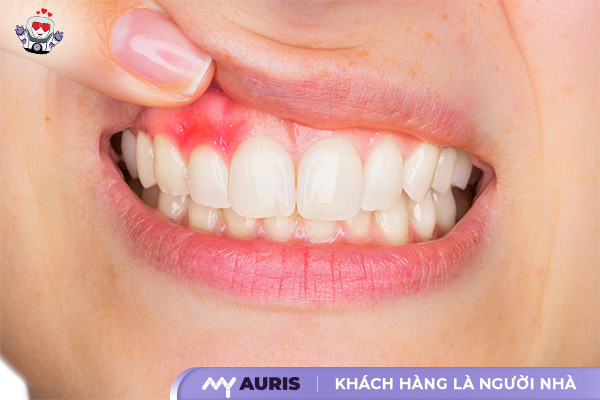
Gum irritation due to porcelain crowns
| Signs | Causes | Remedies restoration |
|---|---|---|
| Swollen, red, painful gums in the area adjacent to the ceramic crown | The ceramic crown is too large, compressing the gums | Revisit the dentist to adjust the porcelain crown accordingly |
| A feeling of stiffness and discomfort | The ceramic crown is too small, creating a gap for food to get caught in | Revisit the dentist to adjust the porcelain crown accordingly |
| The surface of the ceramic crown is not smooth, causing rubbing on the gums | Revisit the dentist to adjust the porcelain crown accordingly | |
| Avoid chewing too hard on the newly crowned tooth area porcelain |
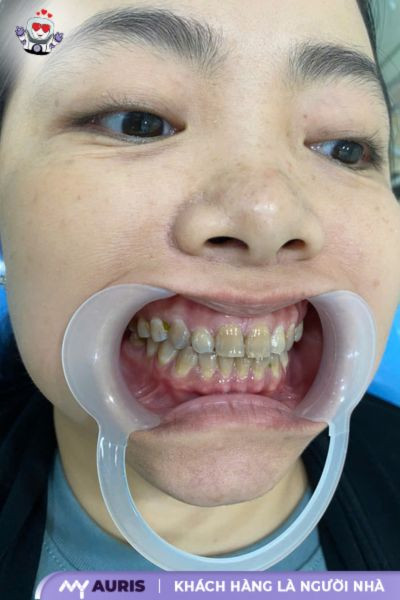
Capped porcelain teeth
| Signs | Causes | Remedies |
|---|---|---|
| Sensation when eating hot, cold, sour foods, sweet | Poor ceramic crown installation technique | Revisit the dentist to check and re-fill the gap |
| Food can easily get caught between teeth | The filling material is not of good quality | Revisit the dentist to check and re-fill the gap |
| Bad breath foul | The technique of attaching porcelain crowns is not good; Poor oral hygiene | Pay attention to thorough oral hygiene, use dental floss to clean between teeth |
Joint problems bite
| Signs | Causes | Remedies |
|---|---|---|
| Pain when chewing and biting | Ceramic crown is incorrectly designed, affecting the bite | Revisit the dentist to adjust the joint bite |
| Headache, temple pain | Ceramic crown is incorrectly designed, affecting the bite | Revisit the dentist to adjust the bite |
| The jaw joint makes noise when chewing | Ceramic crown is incorrectly designed, affecting the bite | Revisit the dentist to adjust the bite bite |
| Avoid chewing hard, chewy foods |
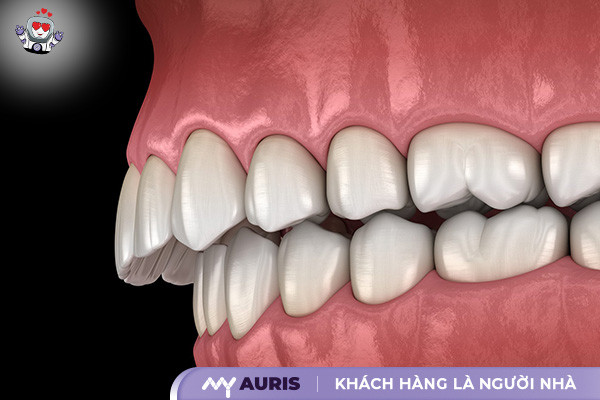
How to fix painful porcelain crowns
Sore porcelain crowns affect daily activities and oral health. Depending on the cause, the “Dentist” will recommend appropriate treatment methods.
Gingivitis treatment
Gingivitis is a common cause of pain after porcelain crowns. Timely treatment helps prevent dangerous complications.
Treatment process:
- Examination and diagnosis: Dentist examines and takes X-rays to evaluate gingivitis.
- Tooth scaling: Removes tartar and plaque – a favorable environment for bacteria to grow.
- Medication use: The dentist prescribes appropriate antibiotics, anti-inflammatories, and pain relievers.
- Hygiene instructions: Instruct patients on proper oral hygiene, using dental floss and mouthwash.
- Regular follow-up examination: Monitor gingivitis after treatment.
“What should you eat and what should you not eat if you have porcelain crowns with sore gums?”:
- Should eat: Foods that are soft, easy to chew, and rich in nutrients such as porridge, soup, yogurt.
- Should not eat: Foods that are hard, chewy, spicy, stimulate gums.
Adjusting porcelain teeth
Improper ceramic crowns cause irritation, pain, and need to be adjusted.
Adjustment process:
- Check: The dentist checks the size and shape of the ceramic crown, determining the position that needs adjustment.
- Refinement: Grind down the part of the ceramic crown that causes irritation, making sure not to rub against the gums.
- Polishing: Polish the ceramic crown again after grinding, creating a smooth surface, avoiding food adhesion.
Treatment of joint problems bite
Misaligned bite caused by ceramic crowns affects chewing function, causing headaches and muscle fatigue.
Treatment process:
- Examination and bite analysis: Dentists use specialized tools to analyze the bite condition.
- Ceramic orthodontic grinding: Porcelain crown grinding, adjusting bite to a balanced state.
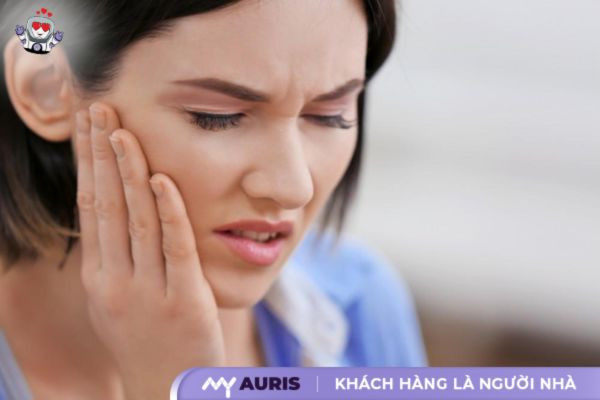
Preventing pain from porcelain crowns
Prevention is always the best way to protect oral health, especially after porcelain crowns. BelowHere are some notes to help you effectively prevent pain.
Proper oral care
Careful oral care is a key factor in preventing infection and pain after porcelain crowns.
How to do it:
- Brush your teeth: Brush your teeth at least twice a day, using a soft-bristled toothbrush, gently brushing vertically or in a circular motion.
- Flossing: Clean between teeth with dental floss at least once a day, removing food scraps and plaque.
- Use mouthwash: Rinse your mouth with antibacterial mouthwash after brushing your teeth, helping to eliminate bacteria and clean the oral cavity.
- Diet: Limit hard, chewy foods, sweets, and carbonated drinks. Increase green vegetables and fruits.
Regular dental check-ups
Regular dentist check-ups help early detection dental problems, from which timely treatment measures can be taken to prevent complications.
Frequency of examination:
- Adults and children from 6 years old: Regular examination every 6 months.
- Children under 6 years old: Periodic examination every 3 months or as directed by the dentist.
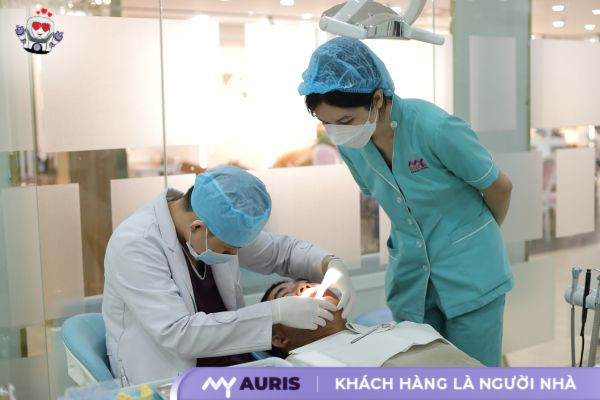
Choose a reputable dentist and clinic
Choosing a good dentist and reputable clinic is an important factor that determines the success of the porcelain crown process and long-term oral health.
Selection criteria:
- Dentist with high professional qualifications: Graduated from a regular University of Medicine and Pharmacy, with a practicing certificate.
- Clinic licensed to operate: Modern facilities, advanced equipment, guaranteed sterility.
- Application of modern technology: Using modern technology in treatment, bringing high efficiency and safety.
- Received many positive reviews: Consult with relatives, friends or search for information on the internet.
Ceramic crowns cause gum pain
Many people after porcelain crowns experience gum pain, affecting chewing and daily activities. Understanding the causes and remedies is essential to protect oral health.
Causes of gum pain
Gum pain after porcelain crowns has many causes, not only related to technique but also oral hygiene.
- Poor oral hygiene: Plaque and tartar build up causing gingivitis, leading to pain. Bacteria that cause infection attack the gums, causing swelling, redness, and bleeding. “If you have porcelain crowns, your gums will hurt after 1 week, what should you do?” The answer is more thorough oral hygiene.
- Improper dental crown technique: Porcelain crowns that do not fit the tooth tightly, are too large or too small, all cause gum irritation. Porcelain teeth are not attached correctly, creating space between teeth and gums, making it easy for food to get stuck, causing infection.
- Incompatible ceramic tooth materials: Some ceramic tooth materials may cause gum irritation in some people. “Do porcelain crowns affect your health?” The answer is yes, if you choose the wrong material, it can cause allergies and gingivitis.
- Chronic gingivitis: If you had chronic gingivitis before getting porcelain crowns, this condition may worsen after getting crowns.
- Damage to gums during preparation: If not careful, the process of grinding teeth before placing porcelain can cause damage to gums, leading to pain.
- Allergic reactions: Rare, but some cases may be allergic to the material of the ceramic crown or the adhesive.
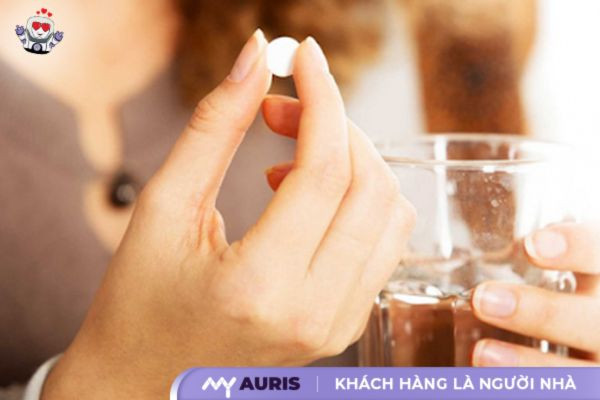
How to overcome pain gums
Depending on the cause, the following ways to fix gum painPorcelain crowns will be different.
Oral hygiene:
Brush your teeth twice a day with a soft-bristled toothbrush and fluoride toothpaste. Use dental floss to clean between teeth every day. Rinse your mouth with saline or antibacterial mouthwash after eating and before bed.
Diet:
“What should you eat and not eat if you have porcelain crowns with sore gums?” Avoid hard, chewy, hot and spicy foods. Eat soft, easy-to-chew foods such as porridge, soup, soft vegetables, soft ripe fruits.
See a dentist:
If gum pain persists or becomes increasingly severe, see a dentist immediately. The dentist will examine the condition of the gums, determine the cause and provide appropriate treatment. Treatment may include: cleaning tartar, adjusting porcelain teeth, replacing porcelain teeth, or prescribing antibiotics and pain relievers.
Pain relievers: Use pain relievers as prescribed by your dentist for temporary pain relief. Absolutely do not use medication arbitrarily.
Avoid stimulants: Avoid smoking, drinking alcohol, and other stimulants because they can worsen inflammation.
It hurts after chewing with porcelain crowns
“Does it hurt after chewing with porcelain crowns?” This question is very common. Pain when chewing after porcelain crowns is a problem that needs to be resolved promptly to avoid affecting oral health and quality of life.
Causes of pain when chewing
Pain when chewing after porcelain crowns can be due to many different causes, including:
- Improper bite: This is the most common cause. If the bite is not adjusted correctly after porcelain crowns, the chewing force will be unevenly distributed, causing pain in some teeth or jaw areas. “Ceramic teeth” are misaligned, hindering the chewing process and causing pain.
- Ceramic crowns do not fit properly: If the porcelain crown is too high or too low compared to the adjacent teeth, it will cause discomfort when chewing. Food can easily get stuck between teeth, causing gingivitis and pain.
- Teeth are ground too much: During the preparation process for porcelain crowns, if teeth are ground too much, it will cause damage to the tooth pulp and pain when chewing.
- Pulpitis: Pulpitis can occur before or after porcelain crowns. This situation causessevere pain, especially when chewing.
- Gingivitis:Gingivitis due to poor oral hygiene or irritation from porcelain teeth also causes pain when chewing.
- Mastication muscle problems: Stress and teeth grinding while sleeping can cause pain in the masticatory muscles, making chewing difficult and painful.
How to overcome pain when chewing
“What should you do to get rid of the pain when you have a porcelain tooth crown?” To overcome pain when chewing after porcelain crowns, you need to determine the cause and take the following measures:
- Re-examine the dentist: This is the most important step. The dentist will check the dental condition, determine the cause of pain and provide appropriate treatment.
- Bite adjustment: If the cause is an incorrect bite, the dentist will grind and adjust the porcelain teeth to improve the bite, helping the chewing force to distribute more evenly. This may require many follow-up visits and adjustments.
- Adjusting porcelain teeth: If porcelain teeth do not fit tightly, the dentist will grind them down to ensure the porcelain teeth fit tightly against real teeth and gums, avoiding irritation.
- Pulpitis treatment: If there is pulpitis, The dentist will perform root canal treatment to relieve pain and prevent complications. Root canal treatment may require multiple appointments.
- Gingivitis treatment: If you have gingivitis, your dentist will give you instructions on proper oral hygiene and may prescribe antibiotics or anti-inflammatory medications.
- Diet: During treatment, you should eat soft foods, easy to chew, avoid foods that are hard, chewy, or difficult to chew. “What should I eat and what should I not eat if I have porcelain crowns and sore gums?” Ask your dentist for specific advice.
- Pain relievers: Your dentist can prescribe pain relievers for temporary pain relief, but they are only a temporary solution, not addressing the root cause.
8. Reduce stress: Stress and anxiety can worsen pain. Try to relax and reduce stress with methods such as yoga and meditation.
Frequently asked questions about painful porcelain crowns
Porcelain dental crowns are a popular dental cosmetic method. However, many people experience pain after getting dental crowns. This article answers frequently asked related questions.
Is it dangerous to get painful porcelain crowns?
Pain after porcelain crowns is not dangerous if detected and treated promptly. However, if ignored, the pain can last longer, cause discomfort, and affect the solen chewing and oral health. In some severe cases, it can lead to severe infection, affecting the jawbone. “Do porcelain crowns affect your health?” The answer depends on whether you take proper care of your teeth and detect unusual problems promptly. Pulpitis and tooth abscess are complications that can occur if pain is not treated promptly.
How long does it take for the pain to go away with porcelain crowns?
The duration of pain after porcelain crowns depends on the cause and treatment method. Some cases only have mild pain for the first few days, then go away on their own. However, if the pain is severe and persistent, you need to see a dentist again. “If you have porcelain crowns, your gums will hurt after 1 week, what should you do?” If the pain still persists after 1 week, you need to see a dentist for a check-up. Treatment duration also depends on the severity of the problem. Some cases only require minor adjustments, while other cases require more complex treatment, extending treatment time.
What should you eat if you have a sore porcelain crown?
When you have pain after getting porcelain crowns, you should eat soft, easy-to-chew foods, avoid hard, chewy, and hot foods. “What should I eat and what should I not eat if I have porcelain crowns and sore gums?” Some suggestions:
- Should eat: Porridge, soup, yogurt, smoothies, soft fruits, soft vegetables, steamed eggs, steamed fish.
- Should not eat: Hard meat, fried foods, spicy foods, sour foods, foods that are too hot or too cold, sweets.
A suitable diet helps reduce pain and support the recovery process. The diet should be nutritionally balanced, providing adequate vitamins and minerals necessary for the body.
Should you see a dentist if you have pain from porcelain crowns? ?
If you have pain after getting porcelain crowns, you should see a dentist immediately. Self-treatment at home can have serious consequences. Your dentist will help you determine the cause of your pain, provide appropriate treatment, and prevent complications. “What should I do if I have pain after porcelain crowns?” “What should I do to get rid of the pain when I have a porcelain tooth crown?” The answer is always to see a dentist.
Does painful porcelain crowns affect your health?
Pain after porcelain crowns, if not treated promptly, can affect oral health and overall health. Severe infection can lead to tooth abscess and blood infection. Prolonged pain causes insomnia, fatigue, and affects work and daily life. CChoosing a reputable “Dental Clinic” with an experienced “Dentist” will help minimize these risks.
My Auris Dental always puts the health and satisfaction of customers first, with the motto “customers are family”. We are committed to providing you with high quality, safe and effective porcelain dental crown services. Please contact My Auris Dental for the best advice and support.
Duong Duong


